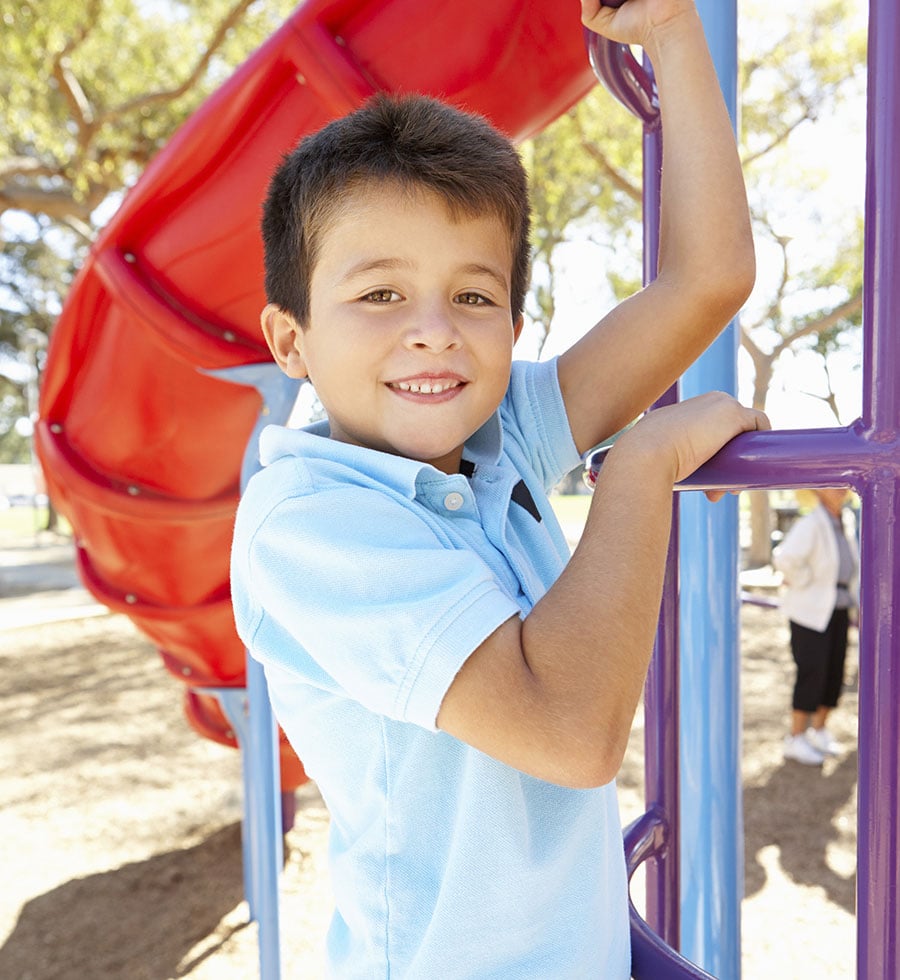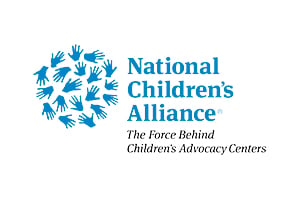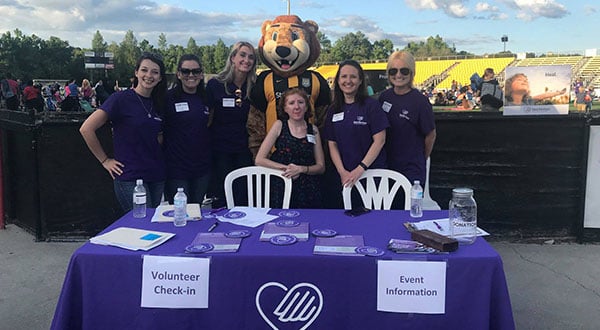
Client Services
Child abuse does not have to define who a child will become. At the Dee Norton Child Advocacy Center, children and families have a safe, child-friendly place they can come to where there is concern about abuse.
What is a CAC?
Children's Advocacy Centers (CACs) are a national model for the multidisciplinary, collaborative response when there is a concern for abuse. CACs bring together social services, law enforcement, prosecutors, and medical and mental health professionals to provide a coordinated, comprehensive response for victims and their caregivers. As an Accredited CAC by the National Children's Alliance, the Dee Norton Child Advocacy Center has demonstrated adherence to standards designed to improve the community's response to allegations of child abuse.

For more information on CACs, visit the National Children's Alliance website.

A neutral, fact-finding interview
A forensic interview is a neutral, fact-finding interview that takes place when there is a concern for abuse or witnessing a crime. It is conducted in a comfortable, unbiased, child-friendly setting and uses non-leading interview techniques. Forensic interviews at Dee Norton are conducted by therapists who are trained in evidence-based techniques for interviewing children. Through the coordination of services with our community partner agencies, we can minimize the number of times a child has to describe their experience with different people.
Mental Health Assessments and Therapy Services
Determining the Need for Therapy
Children who have experienced abuse or trauma are at an increased risk of developing emotional and behavioral difficulties. The mental health assessment includes an evaluation of common difficulties children may have. This appointment lasts approximately 1.5 to 2 hours and includes the caregiver and child each meeting with a trained therapist. Additionally, caregivers and children ages 6 and older answer questionnaires about the child’s emotions and behaviors. The results are used to help guide recommendations for the child and family.
On-Site Therapy Services
For children needing treatment, we offer a host of therapies research has proven to improve symptoms related to trauma. Dee Norton believes children and families deserve therapy that works and uses only evidence-based treatments. Evidence-based treatment is a phrase that means a treatment, or therapy, has been studied in multiple randomized controlled trials and found to be effective in reducing a specific symptom or group of symptoms. Just like prescription medications have research studies to prove they work, therapy for trauma symptoms has advanced to the point that there are now several that improve specific symptoms commonly experienced by child abuse survivors.
-
Trauma-Focused Cognitive Behavioral Therapy
Trauma-focused cognitive-behavioral therapy (TF-CBT)* is the best practice treatment for reducing traumatized children’s emotional and behavioral problems. It is a form of cognitive-behavioral therapy, which relies on the foundation that thoughts, feelings, and behaviors are connected and teaches skills for regulating emotion through each of these areas. Children and families who receive TF-CBT meet weekly with a therapist, both individually and jointly. This treatment typically lasts 12 to 25 sessions.
Child Welfare Information Gateway Fact Sheet
California Evidence-Based Clearing House for Child Welfare*Cohen, Deblinger & Mannarino, 2004
-
Parent-Child Interaction Therapy
Parent-Child Interaction Therapy (PCIT) is an evidence-based treatment for children ages 2 through 8 with disruptive behavior problems. It addresses the emotional, behavioral, and relationship problems* that are commonly seen among abused children and their caregivers. Both caregivers and children participate together in PCIT, which lasts approximately 20 sessions. PCIT has repeatedly been shown to be effective in reducing children’s behavioral problems. Also, children with histories of sexual abuse who have behavioral problems have been shown to benefit from PCIT.
*Eyberg et al., 2001Timmer, Ware, Urquiza & Zebell, 2010; Urquiza and McNeil, 1996.
-
Problematic Sexual Behavior-Cognitive Behavioral Therapy
Problematic Sexual Behavior-Cognitive Behavioral Therapy (PSB-CBT)* is a group therapy designed to reduce or eliminate problematic sexual behaviors in youth. Studies show that youth who act out sexually are different from adult sexual offenders, and a 10-year study of this treatment with school-age children showed that, after treatment, they were no more likely to act out sexually than children who had no history of these behaviors. This treatment involves the family or other support systems, requiring weekly caregiver attendance and active participation, monitoring and supporting the child’s application of skills between sessions, and ongoing assessment of child progress in treatment.
*Carpentier, Silovsky, and Chaffin, 2006
-
Risk Reduction Through Family Therapy
Risk Reduction Through Family Therapy (RRFT)* is designed to address the needs of trauma-exposed adolescents by reducing both trauma-related symptoms and high-risk behaviors such as substance use and risky sexual behavior. RRFT is individualized to the needs, strengths, developmental factors, and cultural background of each adolescent and family.
California Evidence-Based Clearing House for Child Welfare
*Danielson., 2007
-
Alternatives for Families: A Cognitive Behavioral Therapy
Alternatives for Families: A Cognitive Behavioral Therapy (AF-CBT)* is designed to improve the relationship between children and caregivers in families where there is a history of excessive physical force/discipline, child physical abuse, frequent conflict, and/or child behavior problems. AF-CBT is typically delivered weekly over 6 to 12 months. During AF-CBT, school-aged children (5 to 17 years old) and their caregivers participate in separate but coordinated therapy sessions, often using parallel treatment materials. Children and caregivers also attend joint sessions together at various times throughout treatment. AF-CBT has been found to improve child behavior problems, improve parent-child relationships, and reduce the risk for child physical abuse.
*Kolko, Brown, Shaver, Baumann & Herschell, 2011
-
Child and Family Traumatic Stress Intervention
Child and Family Traumatic Stress Intervention (CFTSI)* is an intervention shown to help prevent trauma symptoms from developing among children who have experienced a traumatic event such as abuse. CFTSI is provided to children and adolescents within the first 30 days of having experienced a traumatic event. The goals of CFTSI focus on increasing communication between caregiver and child about trauma-related feelings, symptoms, and behaviors to increase the caregivers’ support of the child. It also teaches both the caregiver and child to enhance their ability to cope with traumatic stress reactions. CFTSI is provided once or twice a week over 5 to 8 sessions.
*Berkowitz & Marans, 2011
-
Clarification
Children who report having been abused have felt a lapse in protection by an adult. Feeling safe is necessary for children to flourish and succeed. The Clarification process is one in which caregivers work with a therapist to clarify for the child that the responsibility for protection lies with adults, and to improve the child’s sense of safety by a protective caregiver through improved communication and safety planning.
Caregivers are an essential source of support for children
Caregiver and Family Assessments are designed to create a safe space for caregivers to share their experiences, and for caregivers to receive support and recommendations that will help the caregiver understand and learn how to respond to his or her child’s reactions.
Experts in Comprehensive Care
The Dee Norton Child Advocacy Center believes that all children who have been abused or neglected deserve access to a medical exam. Through a partnership with the Medical University of South Carolina Department of Child Abuse Pediatrics, we have board-certified child abuse pediatricians, as well as pediatric nurse practitioners, who provide comprehensive forensic medical evaluations at Dee Norton. The medical evaluations may find physical evidence of child abuse or neglect, identify medical issues that need attention, and provide reassurance to the caregiver and the child regarding any concerns they might have about the child’s body.
Sharing expertise to reach the best outcomes for children
Case coordination occurs in a variety of ways, including weekly multidisciplinary team (MDT) case review staffings during which professionals give input into the assessment of needs and the development of safety and treatment plans. The staffing team discusses recommendations and updates regarding protection, case management, prosecution, and needed services, and monitors the progress of each case through the MDT process.
-
Commercial Sexual Exploitation of Children and Human Trafficking
The Commercial Sexual Exploitation of Children (CSEC) is a severe form of sexual abuse commonly known as child sex trafficking. It involves the sexual abuse of a child in exchange for something of value (e.g., money, housing, etc.). Dee Norton’s IMPACT (Improving Multidisciplinary Partnerships to Address Child Trafficking) Program aims to develop and strengthen our community’s response to youth victims of CSEC and to provide coordinated interventions that reduce the negative impact of this abuse on victims. When a potential youth victim is identified, Dee Norton and its multidisciplinary partners work collaboratively to prioritize needs and determine an individualized plan of action for moving forward.




